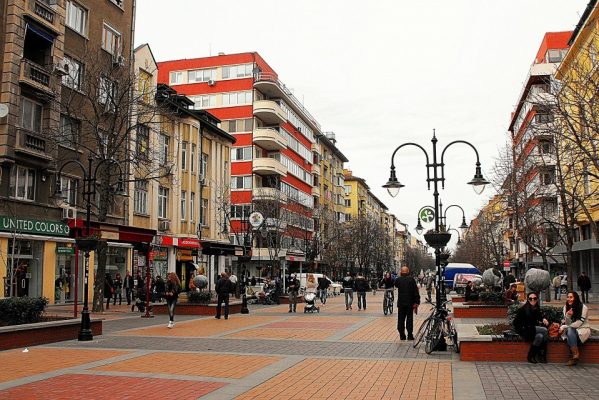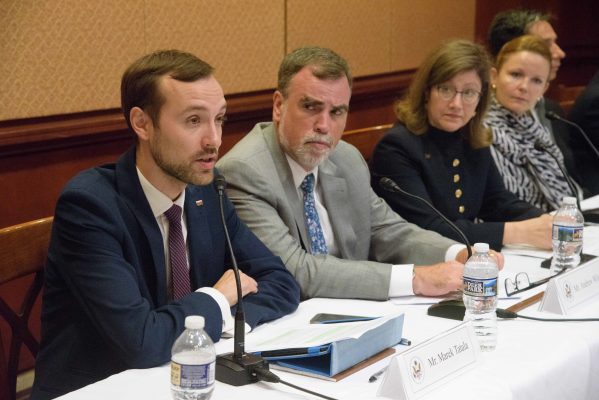
Making the Case for a Pro-Reform Path in Central and Eastern Europe
It’s been exactly one year since the signing of the Declaration in support of democracy in Brussels. As part of CIPE’s observance, we share more perspective from thought leaders in Central and Eastern Europe.
Marek Tatala, Vice President and Economist at the Civil Development Forum (FOR) comments on the state of democracy in Poland in an interview for a new published report on authoritarian populism by Libertarian Klub – Libek. Tatala reflects on reform efforts over recent decades in Poland, noting that, “thanks to the initial free market reforms, and continuation of the pro-reform path, we observed both rapid and stable rate of economic growth in Poland.” However, Tatala also points out that a recent turn away from market-oriented democratic reforms is a concerning development in the country. In response, Tatala has been vocal in his support of democracy, including comments made during a podcast with CIPE on the role of civil society and reform measures in democratic development. He also launched the #FORDemocracy campaign on Twitter to highlight the Declaration and its contribution toward promoting democratic values in the region.

A Complex Relationship between Democracy and the Free Market
Georgi Ganev, of the Institute of Market Economy (IME) in Bulgaria, is among those who continue to be outspoken on the benefits of democracy and market-oriented reform. In the article below, which was just recently translated into English, Ganev analyzes the complex relationship between the free market and democracy.
The nature of the relationship between democracy and market economy provokes much debate.
According to some observers, such as Milton Friedman, the relationship between the two is intrinsically positive. Free markets support democracy because they produce a large number of economically independent individuals who are the only ones capable of ensuring true democracy. In turn, democracy strengthens markets because it provides a mechanism to protect economic independence of individuals from being taken away.
Other observers, such as Hans Hoppe, believe that democracy undermines market economy. According to Hoppe, democracy, especially in view of its regular elections, inevitably and drastically shortens policy’s temporal horizons. At first glance, these two views appear to be mutually exclusive. However, in a certain context, either may offer a legitimate description of the relationship between democracy and the free market.
When this relationship unfolds over time, it may turn out to be dialectical, i.e. characterized by multiple complexities, delayed responses, and non-linear dynamics that persistently demonstrate contradictory tendencies. From this perspective, the history of market democracy may be told as follows. At first, about 300 years ago, some societies had small elements of market institutions and democracy. Gradually, due to what Deirdre McCloskey, professor at the University of Illinois in Chicago, called a revolution in morality and rhetoric, the social validation of the new bourgeoisie society begins. Namely, political and economic opportunities open up for the bourgeoisie to first improve its own life and then to improve the life of others through market mechanisms.
This involves both a process of political democratization with its opportunities for expanded personal freedom, as well as a process of market growth where these opportunities are tested and selected in terms of their long-term utility for society. As economists Douglass North, John Wallis, and Barry Weingast put it, this was the development of a social order that opens access to political and economic opportunities.
During this period—which can be called the golden age for the 19th century liberalism—the development of democracy and free market in some societies went hand in hand and supported each other. In the 20th century, especially in its second half, things appear to change. There is again a revolution in morality and rhetoric where the market is increasingly perceived as harmful and amoral, while other values are gaining in popularity. This process coincides with the emergence of redistribution, which can be a result of democratic processes but often comes in conflict with the free market’s function to test and select some for employment (to create wealth), while leaving others out as unemployed.
Most countries today have reached the point where the distribution of democratic rights and freedoms has been completed: everyone has the right to vote and the right to be elected, and all citizens are afforded their constitutional rights. This is the end of an age-long process of bestowing the rights by the rulers for more and more social groups. When this process ends, that is when all possible rights have been given to all citizens, there is nothing more to bestow to obtain political support. At this point, elected officials begin to redistribute, i.e. to take away from some and give to others.
This is also the point where democracy develops trends that can hinder the market’s ability to improve living standards and material wealth of the population. The government raises its spending and redistribution, but increasingly does it at the expense of the free market’s ability to support economic growth necessary for improvement in living conditions for all.
Thus, contemporary societies face a dilemma, whether consciously or not. They may choose to continue with, or even intensify, redistribution, which will always enjoy democratic support because those who lose are always a minority compared to those who gain. However, growth rates slow down over time and these societies increasingly find themselves behind others that choose to redistribute less. Eventually, this will lead to a decline in the standard of living for all.
This fundamental conflict is brewing right now, intensifying continuously, and its outcome is far from being clear. Regardless of which direction is adopted by a given society, there will be a visible change: either this society will redistribute less than in the past an focus on inclusive growth, or it will become stricken by poverty. In case of the former, democracy will be reinforced by growing prosperity and improved standard of living. In case of the latter, democracy will likely be undermined by social frustration over growing impoverishment.
A longer version of this blog was originally published by IME in Bulgarian.
Connor Leach is a Program Assistant for Europe at the Center for International Private Enterprise (CIPE).
Published Date: June 01, 2018